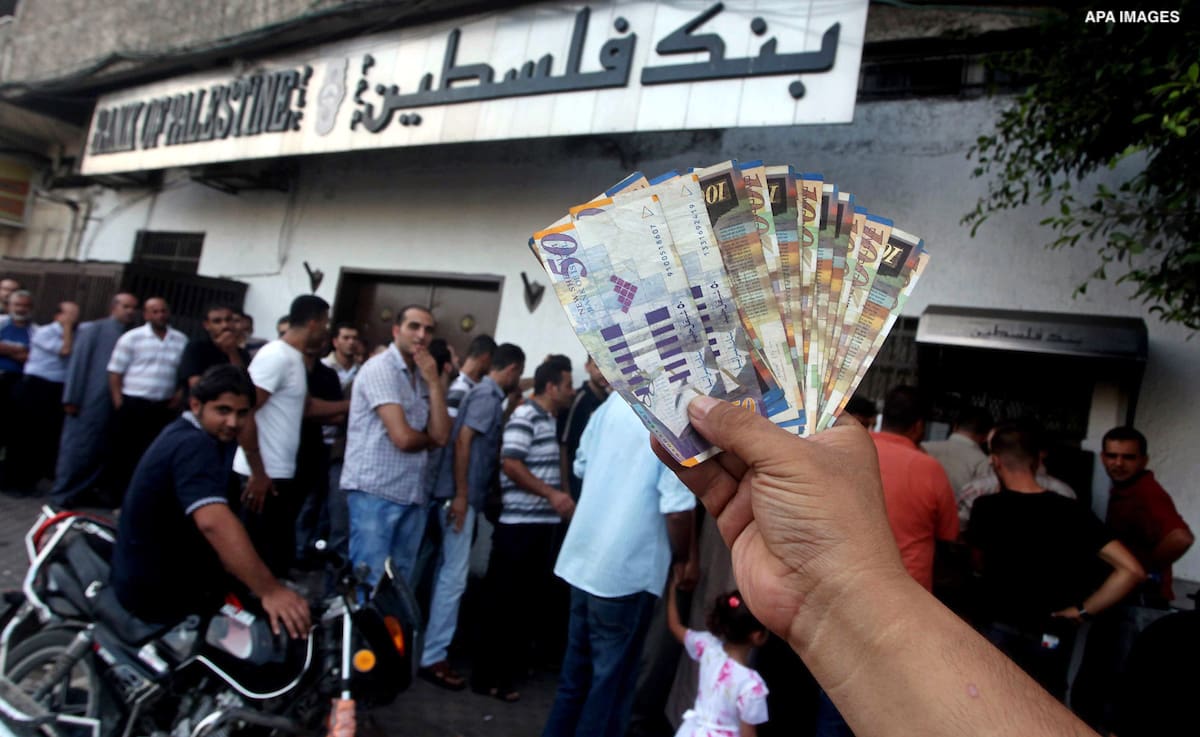
The Palestinian Authority’s (PA) role in the Palestinian economy is central. Although its economic policies contributed to entrenching the West Bank and Gaza’s dependency on Israel – a dependency embedded in the Oslo Accords and the Paris Protocol – it has arguably maintained a singular economic system in the West Bank.
Nonetheless, the political and institutional division between the West Bank and Gaza has split the Palestinian economy in two. Trade relations are limited due to the Israeli regime’s blockade on Gaza, as are fiscal revenues from Gaza to the PA; only large companies with branches in both the West Bank and Gaza pay taxes to the PA. Moreover, Gaza’s economy is mostly informal, which implies high tax evasion. Circumstances in Gaza suggest that the collapse of the PA would deepen the economic divide between the West Bank and Gaza.
The collapse of the PA would also instantly put approximately 140,000 public-sector employees out of work — employees who serve as breadwinners for around one third of the Palestinian population in the West Bank, including 58,000 security sector employees. The implications of this collapse cannot be overstated. On the one hand, a mass increase in unemployment and poverty would impel these workers to seek employment in 1948 territories or in Israeli settlements in the West Bank. On the other hand, wealthy PA officials would invest either in the domestic private sector or in foreign markets. As a result, the public pension fund would dry up and retired employees would not receive their much-needed financial support.
The collapse of the PA would also be disastrous for Palestinians’ access to basic utilities. While most utilities, including water and electricity, are supplied by Israeli regime authorities, the PA exclusively imports fuel to the West Bank and Gaza. Should the PA collapse, shortage in petroleum derivatives would occur in the short term, though in the long term the Israeli regime would implement mechanisms to supply fuel to avoid political uprising.
The Israeli regime would additionally continue to buoy security forces in the West Bank in order to control the Palestinian population and avoid mass resistance. Likewise, the international community would most probably pour funds into remaining NGOs, local institutions, and municipalities for the same purpose. The result would only further economic dependence on aid and adherence to donor conditions.
Moreover, in the absence of a central Palestinian governing body, the Israeli Civil Administration would return as the direct supervisor of Palestinian economic activity in the West Bank and would coordinate the local economy. Indeed, the Civil Administration has already involved Palestinian producers in common projects and has been conditionally subsidizing Palestinian agriculture in Area C of the West Bank.
Finally, the new social classes that have emerged in recent years, including traders and NGO workers, would be strengthened if the PA collapsed, including by seeking political office. This would be similar to the Israeli regime’s 1970s initiative to promote alternatives to the Palestine Liberation Organization (PLO) through the Village Leagues (Rawabet al-Qura). As part of this plan, Israel organized agricultural cooperatives, promoted conflict resolution at the village level, and later funded and supplied some of the villages with arms. Reintroducing a localized economy with cooperation with local institutions and NGOs would lead to a recreation of this system, but with economic rather than martial power. In other words, local political leadership would be given the economic and political power to sustain Israel’s subjugation of Palestinians.
Importantly, the robustness of the PLO and its wide representation of Palestinians in Palestine and in the diaspora, as well as the unity among Palestinians in Palestine in the 1970s, were key elements in defeating the Israeli regime’s plan to replace the PLO through village leagues. As such, the reinforcement and reconstruction of Palestinian political representation would be necessary to defeat these plans.
Al-Shabaka Policy Member Tareq Sadeq is a Palestinian refugee from the village of Majdal Sadeq near Jaffa and currently lives in Ramallah. Tareq holds a Ph.D in economics from the University of Evry Val d’Essonne in France, where he was engaged in the Palestine solidarity movement and served as head of the General Union of Palestinian Students (GUPS). Currently, Tareq is assistant professor in the Department of Economics at Birzeit University. He has published on monetary policy, macroeconomics, econometrics, labour economics, income inequalities, and entrepreneurship. He is also a researcher in Palestine’s Global Entrepreneurship Monitor (GEM).










